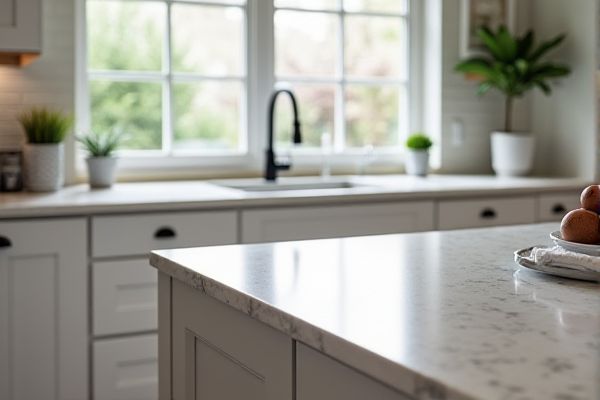
Laminate countertops offer a budget-friendly and versatile option with a wide range of colors and patterns, while quartz countertops provide superior durability, resistance to stains, and a luxurious appearance that mimics natural stone. Discover which countertop material best suits Your kitchen needs by exploring the detailed comparison in the rest of this article.
Table of Comparison
| Feature | Laminate Countertop | Quartz Countertop |
|---|---|---|
| Material | Layered paper and resin bonded to particleboard | Engineered stone made from natural quartz and resin |
| Durability | Moderate; prone to scratches and heat damage | Highly durable; resistant to scratches, stains, and heat |
| Maintenance | Low; requires basic cleaning | Low; non-porous and easy to clean |
| Cost | Budget-friendly; $20-$50 per sq ft | Premium; $50-$150 per sq ft |
| Appearance | Wide range of colors and patterns; less natural look | Natural stone appearance with variety of colors and patterns |
| Installation | Lightweight; easier and quicker to install | Heavy; requires professional installation |
| Resistance to Stains | Low; can stain if exposed to certain substances | High; stain-resistant due to non-porous surface |
| Lifespan | 5-15 years depending on use | 25-30 years or more with proper care |
Introduction to Laminate and Quartz Countertops
Laminate countertops feature a composite wood base covered by a printed decorative layer sealed with a clear protective surface, offering affordability and a wide range of design options. Quartz countertops are engineered stone surfaces composed of approximately 90-95% natural quartz crystals bound with resin, providing superior durability, non-porous properties, and resistance to staining and scratching. Both materials serve distinct functional and aesthetic needs in kitchen and bathroom design, with quartz generally favored for high-end applications and laminate for budget-conscious projects.
Material Composition: Laminate vs Quartz
Laminate countertops are composed of layers of paper or fabric impregnated with resin, bonded to particleboard or MDF, offering a lightweight and cost-effective surface. Quartz countertops consist of engineered stone made from approximately 90-95% natural quartz combined with resins and pigments, providing exceptional durability and resistance to stains and scratches. Your choice between laminate and quartz hinges on desired material properties, budget, and maintenance preferences.
Appearance and Design Options
Laminate countertops offer a wide range of colors, patterns, and textures that can mimic natural materials like wood and stone, making them versatile for various interior styles. Quartz countertops provide a more luxurious appearance with consistent patterns and a polished finish, often featuring subtle veining and speckles due to their engineered stone composition. Both materials allow customization, but quartz typically delivers a premium, high-end aesthetic perfect for modern and elegant kitchen designs.
Durability and Resistance to Damage
Quartz countertops offer superior durability and resistance to scratches, stains, and heat compared to laminate countertops, which are more prone to surface damage and delamination over time. The engineered stone composition of quartz provides a non-porous surface that resists bacteria and moisture infiltration, enhancing longevity. Laminate countertops, while cost-effective, can chip or scorch more easily under heavy use, making quartz the preferred choice for high-traffic kitchens demanding robust performance.
Maintenance and Cleaning Requirements
Laminate countertops require minimal maintenance, needing only regular wiping with mild soap and water to prevent stains and scratches. Quartz countertops offer superior durability and resist staining, but cleaning demands non-abrasive, pH-balanced cleaners to maintain their polished finish. Both materials avoid sealing, but quartz's denser surface ensures easier long-term upkeep compared to laminate's vulnerability to heat and impact damage.
Cost Comparison: Laminate vs Quartz
Laminate countertops offer a budget-friendly option, typically costing between $10 and $40 per square foot, making them ideal for cost-conscious homeowners. Quartz countertops, known for their durability and elegance, usually range from $50 to $150 per square foot, reflecting their premium material and manufacturing process. Your choice will balance affordability and long-term investment, with laminate saving upfront costs and quartz providing lasting value.
Installation Process and Complexity
Laminate countertop installation is generally straightforward, involving cutting to size and adhesive application, making it a DIY-friendly option with minimal tools needed. Quartz countertops require professional installation due to their heavy weight, precise measuring, and specialized cutting tools to ensure accuracy and prevent damage. Your choice may depend on whether you prefer a quicker, simpler installation or a more durable, high-end finish that demands expert handling.
Environmental Impact and Sustainability
Laminate countertops have a lower initial environmental footprint due to their use of composite wood and plastic resins, but their shorter lifespan leads to more frequent replacement and waste. Quartz countertops are more durable and long-lasting, reducing the need for replacement and minimizing landfill impact over time; however, their manufacturing process involves significant energy use and mining activities. Choosing between these materials requires balancing immediate resource use with long-term sustainability considerations.
Pros and Cons: Laminate Countertops
Laminate countertops offer an affordable and versatile option with a wide range of colors and patterns, providing a budget-friendly choice for stylish kitchen surfaces. They are resistant to stains and easy to clean but can be prone to scratching, chipping, and heat damage, limiting their durability compared to quartz. If you seek a low-cost, low-maintenance countertop that delivers a variety of design options, laminate may suit your needs despite its lower resistance to wear and tear.
Pros and Cons: Quartz Countertops
Quartz countertops offer exceptional durability and resistance to scratches, stains, and heat, making them ideal for high-traffic kitchens. They require minimal maintenance since they are non-porous, preventing bacterial growth and eliminating the need for sealing. However, quartz can be more expensive than laminate, and prolonged exposure to direct sunlight may cause discoloration over time.
 homyna.com
homyna.com